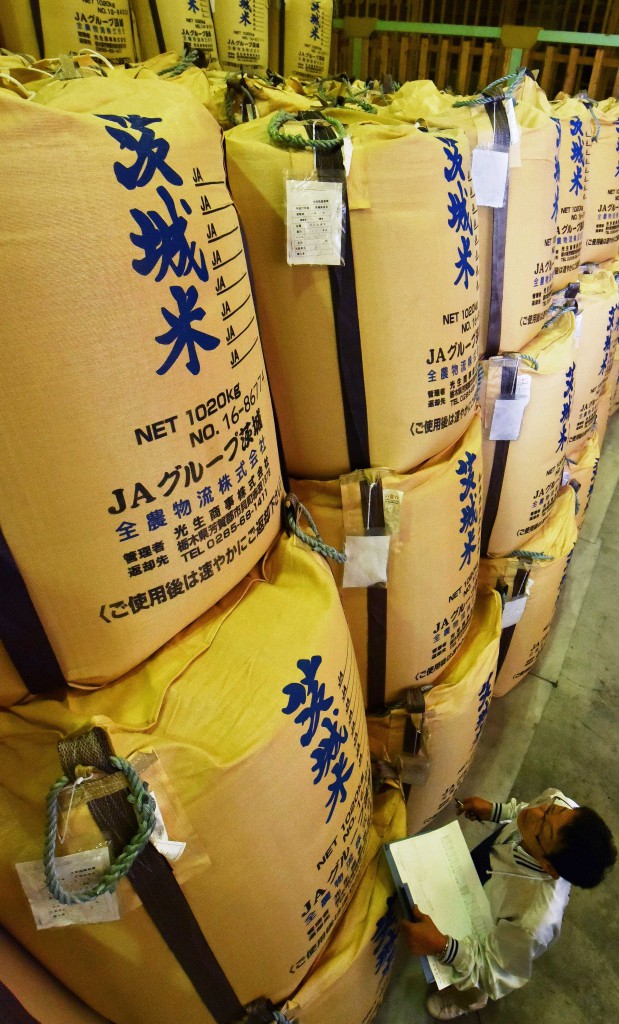
Koshihikari brand rice bags are piled up in a warehouse of JA Kitatsukuba in Chikusei, Ibaraki Prefecture
Satoshi Furusawa, a 58-year-old farmer who grows rice on some 30 hectares of paddies in Chikusei, Ibraki Prefecture, says he is increasingly concerned that under the Trans-Pacific Partnership free-trade agreement, domestically-grown rice will be forced out from the market for restaurants and ready-made foods.
In the area where JA Kitatsukuba, a farm co-op in Chikusei, serves, rice farmers have recently been expanding sales channels to food service companies. As for table rice they harvested in 2015, 70 percent of the total annual yield of some 17,800 tons are sold to such companies. Their major brand Koshihikari is known for good taste, and it is popular among restaurants and convenience stores as its price is cheaper than Koshihikari produced in Niigata Prefecture. However, new import quotas to be established under the TPP agreement will be expanded to as much as 78,400 tons over the years. Although the government plans to increase purchases of rice for reserves along with expected rise in imports, imported rice is most likely to compete with home-grown rice in the market for food service firms where buyers look for reasonable prices.
Furusawa says he suffered from price declines in rice produced in 2014, ending up with some JPY5 million year-on-year drop in revenues from rice. He fears that an influx of low-priced imports could push down domestic market prices further. “It is ironic that regions which followed the government’s policies of producing rice that meets market demand are hit harder,” he said furiously.
Increasing interest in imported rice
Under the TPP agreement, Japan maintained the JPY341-per-kg tariff on rice, but will establish new tariff-free annual quotas separately for the United States and Australia which will be expanded over 13 years to total 78,400 tons. Rice to be imported within the new quotas will be traded under simultaneous buy-and-sell (SBS) orders and will be sold in the domestic market with a markup added on to the imported price. But if the quotas are not filled in two out of three years, the government will cut the minimum markup by 15 percent. In the case of U.S. rice, the price at home was about JPY70 per kg in 2013, compared with JPY245 for rice grown in Japan. If the minimum markup is reduced, the price difference could become wider.
Some companies in the food service industry are showing interest in the new quotas. A major restaurant chain which currently uses home-grown rice says it will consider changing to imported rice if quality is assured at reasonable prices. Another major beef bowl restaurant chain says it plans to participate in SBS trading in the future, considering that U.S. rice is getting closer to domestically-grown rice in terms of quality.
Concerns over continuity of rice policy
As many tariffs will be reduced or eliminated under the TPP agreement, revenues from levies on agricultural and livestock products will drop largely, presumably leading to less budget allocations for the farm sector. Rice producers increasingly worry whether the government can maintain its rice policies.
Many of the rice growing regions hit by low prices shifted their production to rice for feed for the 2015 harvest season in line with the government’s policies. As for the district where JA Kitatsukuba serves, the cultivation area of rice for feed rose more than threefold from a year before to some 1,400 hectares this year. Seikiguchi Sogyo, an agricultural corporation of Chikusei, doubled its cultivation area of rice for feed to 40 hectares. “(But) we can’t create our medium- to long-term vision unless we know how long the government’s policy on the production of rice for feed will continue, including the amount of grant,” says Kouji Sekiguchi, 35, who heads the firm.
Officials of the farm co-op which plays the leadership role in rice farming call on the government to swiftly come up with lasting measures that lead to stable management of rice farming, including income compensation for producers.
(Nov. 7, 2015)

